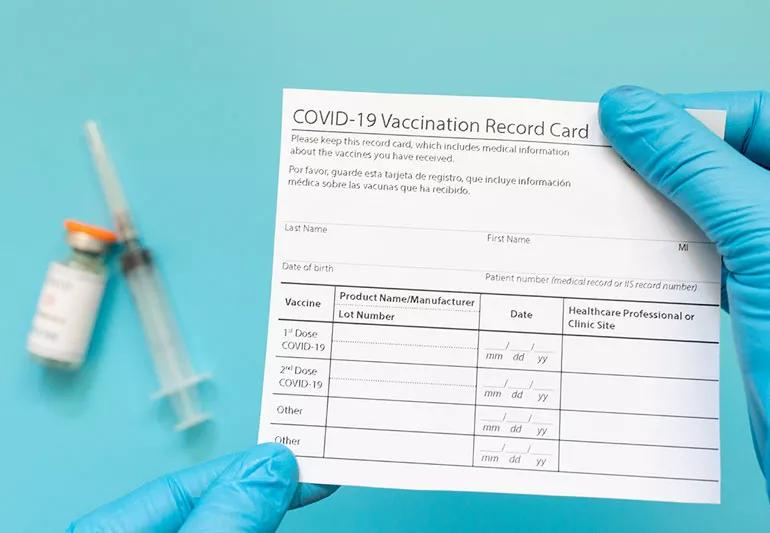
Just like losing your credit card or driver’s license, losing your COVID-19 vaccination card is no fun. Especially if you’re planning a trip or going to a venue that requires proof of vaccination, you don’t want to lose track of that little white document.
Cleveland Clinic is a non-profit academic medical center. Advertising on our site helps support our mission. We do not endorse non-Cleveland Clinic products or services. Policy
But there’s no need to worry, as there are steps you can take to make sure you get a card back in your hands. Even if you can’t return to your original vaccination site or healthcare provider, your state’s health department has a record of your vaccinations.
Family medicine specialist Daniel Allan, MD, explains what to do if your vaccine card has disappeared without a trace.
First things first, don’t panic. Your vaccination card can indeed be replaced. But this will depend on where you got your vaccine, how many doses you’ve had and your state.
But before we get into what you should do, let’s also go over what you shouldn’t do. Your impulse may be to contact the Centers for Disease Control and Prevention (CDC), but you’ll be out of luck there. The CDC doesn’t keep a record of your personal vaccination.
So, let’s get into it. Here’s what you do if you misplaced your vaccine card:
Seems obvious, right? The first surefire way to get your vaccine card replaced is to go back to the source. If you received your shot at a CVS, Walgreens or other pharmacy location, they should have your information on file and will be able to replicate a card for you. But keep in mind, if you got vaccinated at a temporary vaccination site, that won’t be available to you.
If you misplaced your vaccination card while it’s only half full (that is, you haven’t had your full number of doses), then your journey ends here. As long as you go back during your scheduled time at the vaccination site to get your second dose, they should be able to give you a new card with both completed shots. Note: This doesn’t apply to booster shots. For example, if you got your first two doses at one location and then a booster shot at a separate one, the place where you got your booster shot won’t have your full record.
If you got your shot at a temporary site that’s now just a parking lot, you’ll have to go to plan B. The next viable option is to go see your primary care doctor. If you’ve seen your healthcare provider since you got your initial vaccination, there’s a good chance they collected a record of all the vaccines you’ve received recently. If they do have this information — hooray! Your doctor should then be able to order a new card.
If all else fails, you can turn to your state’s health department for help. Depending on where you live, you can request a new card this way (and yes, this may take a little longer, depending on where you are).
Not sure where to start? Check this list to find out which departments or agencies in your state have access to your immunization record.
“It’s a little bit of a cumbersome system because you have to actually fill out a form. You have to print it. You have to fill it out,” Dr. Allan says of the process in Ohio, for example.
“You cannot do it electronically. You cannot fax it or email it. It all has to be done through the mail.”
In other words, be prepared to give yourself some time to get your vaccine card back if this is your best option.
The main advice to follow when trying to keep your card safe and secure? Take a photo of your vaccination card. Simple as that! This way, you’ll have your own record of the information on the card, and you’ll be able to use that to help get a replacement if you ever need one. Another hot tip: Back it up to the cloud or another hard drive.
As for your physical card, you should store it as securely as you do your birth certificate. Keep it in a safe, locked drawer, file cabinet or a place you’ll know it won’t get lost. Lastly, be sure to keep your healthcare provider in the loop. If you end up getting any COVID-19 booster shots (or any vaccine boosters for that matter), let your doctor know so they can keep a record for you.
“The smartest thing you should do to make your life immensely easier is to make sure your primary doctor has all the information,” advises Dr. Allan. “Even if you got your shot somewhere else, we can still keep an active vaccine record.”